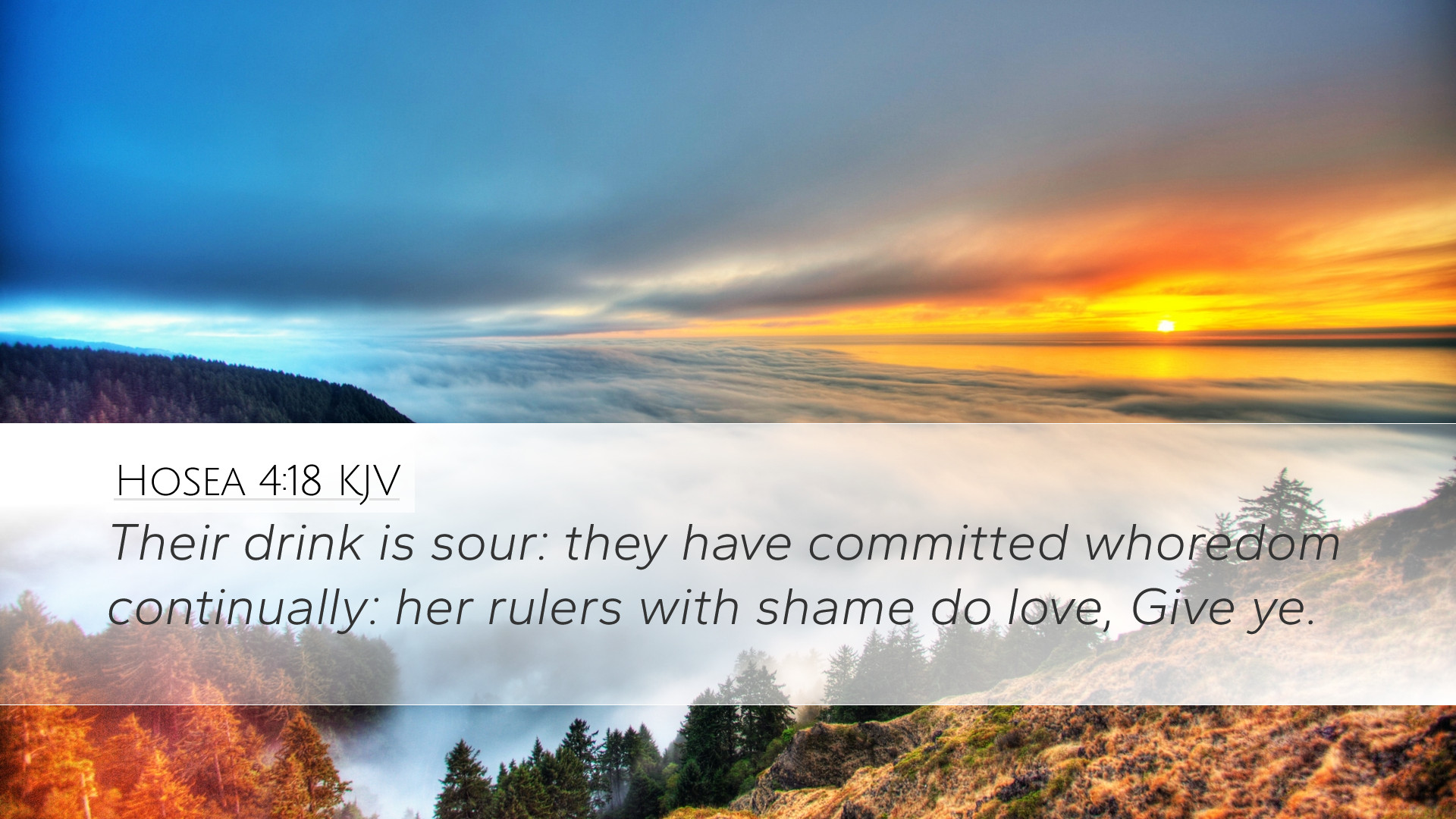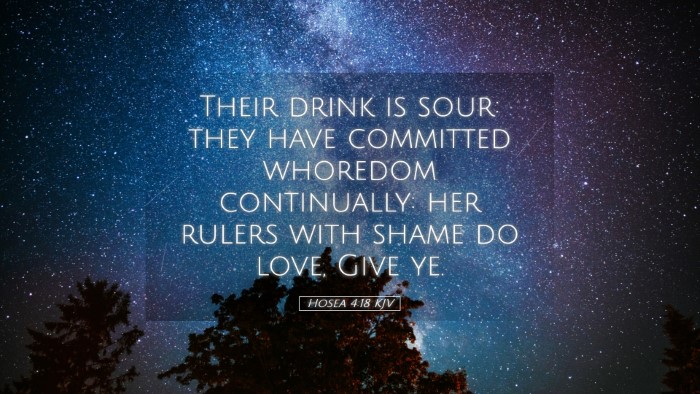Old Testament
Genesis Exodus Leviticus Numbers Deuteronomy Joshua Judges Ruth 1 Samuel 2 Samuel 1 Kings 2 Kings 1 Chronicles 2 Chronicles Ezra Nehemiah Esther Job Psalms Proverbs Ecclesiastes Song of Solomon Isaiah Jeremiah Lamentations Ezekiel Daniel Hosea Joel Amos Obadiah Jonah Micah Nahum Habakkuk Zephaniah Haggai Zechariah MalachiHosea 4:18
Hosea 4:18 KJV
Their drink is sour: they have committed whoredom continually: her rulers with shame do love, Give ye.
Hosea 4:18 Bible Commentary
Commentary on Hosea 4:18
Verse: "Their drink is sour: they have committed whoredom continually: her rulers with shame do love, give ye." (Hosea 4:18)
Introduction
This verse from the book of Hosea encapsulates the spiritual and moral decline of Israel during a time of great idolatry and unfaithfulness to God. The metaphorical language reflects profound dissipation in both personal and collective spiritual life. The insights drawn from public domain commentaries such as those by Matthew Henry, Albert Barnes, and Adam Clarke highlight the multilayered meaning and implications of this scripture for both historical Israel and contemporary readers.
Contextual Analysis
The context of Hosea's prophecy is essential for understanding this verse. Israel, having strayed from its covenant with Yahweh, indulged heavily in idolatry and immorality. The use of the word "whoredom" signifies not only sexual immorality but also spiritual unfaithfulness. This context is pivotal as it illustrates the dire consequences of turning away from God.
Historical Background
During the 8th century B.C.E., Israel was experiencing both political instability and moral decay. The nation had been enticed by surrounding nations and their practices, which led to a divided loyalty—between Yahweh and the local deities. The rulers of Israel, their corruption evident, failed to lead the people towards righteousness, instead wallowing in shameful behaviours that led to their downfall.
Verse Breakdown
“Their drink is sour:”
This phrase indicates the bitterness and disappointment in the spiritual “drink” that the people of Israel indulge in. Matthew Henry elaborates that this signifies a state of mind and soul that is intoxicated not by the joy of communion with God, but by the bitterness of sin. They have become accustomed to a sour lifestyle, devoid of the sweetness found in God’s presence.
“they have committed whoredom continually:”
Albert Barnes notes that the continual act of whoredom represents a persistent and unrepentant engagement in idolatry. This reflects not only a sexual connotation but also symbolizes the deeper betrayal of God's covenant. The people are likened to an unfaithful spouse, illustrating how their legacy of sin has spanned generations, indicating a systemic issue rather than isolated events.
“her rulers with shame do love, give ye:”
Adam Clarke points out that this directly criticizes the leaders of Israel. These rulers, who are supposed to uphold justice and righteousness, are instead characterized by their shameful behaviours. Their love for shame suggests a willing engagement in sin rather than a struggle against it. It leads to the exhortation to “give ye” - a call to consider the consequences of their actions and the ensuing decline of society’s morals.
Theological Implications
This verse poses a dire warning regarding the consequences of abandoning a life dedicated to God. The "sour drink" signifies both the immediate and eternal repercussions of a life lived outside of God’s will. The inherent invitation here is to reflect on where one draws their sustenance.
Moral and Spiritual Decline
The text warns of the natural progression from spiritual decline to moral decay. Hosea's message is a clarion call to the modern church and individual believer: the path of apostasy leads not only to spiritual barrenness but also to societal chaos. As leaders reflect the character of their people, this verse serves as both a mirror and a challenge to those in positions of responsibility.
Repentance and Restoration
Moreover, while the verse serves as a rebuke, it implicitly opens the door to the hope of repentance. The acknowledgment of sin, like that highlighted by Hosea, is the first step towards restoration. For pastors and students of the Word, the overarching message remains clear: spiritual restoration begins with an honest confrontation with sin and the rejection of the sour drink for the sweetness found in God’s grace.
Conclusion
Hosea 4:18 is a profound reminder of the consequences of unfaithfulness to God, resonating through both time and culture. As Matthew Henry, Albert Barnes, and Adam Clarke elucidate, the themes contained here speak not only to the ancient Israelites but also to contemporary believers who must navigate similar temptations and challenges. The call to holiness, righteousness, and repentance stands timeless, urging us all to seek the true joy found in faithful allegiance to God.


